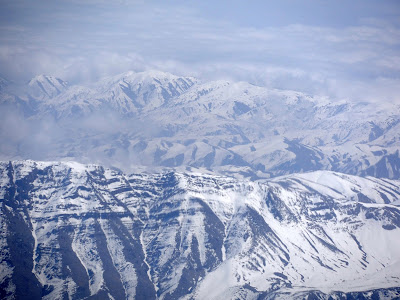It has been roughly a month and a half since my last blog entry. And, as you might imagine, there is a great deal to report. Life at the school has been extraordinarily hectic and my responsibilities have doubled. There were many events in the past six weeks that I wanted to write about, but I just couldn't find the time, energy or inspiration. So, I will attempt to recap two of the more noteworthy and interesting experiences I have had.
 |
| Two young ANIM students |
During November and December, I was involved in the audition process for the incoming fourth grade class. I observed and graded what seemed like hundreds of little Afghan children, all desperate to come to ANIM and study an instrument. The little applicants were roughly nine to eleven years old and came from either
Afceco, or from families living in Kabul. We typically asked them to start by singing a song of their choice. We then proceeded to go though a set of rhythm and singing exercises designed to measure musical ability. Some kids aced the exam, while others couldn't even follow our basic instructions. Some were exceptional in their grasp of rhythm, but turned out to be completely tone-deaf. Others could sing a beautiful melody and had no sense of rhythm whatsoever. It was a fascinating thing to observe. At the end of the exam we would ask what instrument they would like to study. Interestingly, the top four answers were almost always, piano (known here as "casio"), drums (known here as "jazz"), violin and guitar. Occasionally, a child would request one of the Indo-Afghan instruments such as rubab, tabla or sitar, but it was a rare occurrence. The truth is that most of the kids wouldn't be able define more than five musical instruments. So, as we gear up to start a new semester in March, I am eager to see which new students might choose to try this thing called a "cello."
 |
| Snowball fight! |
Another story from the past month has to do with a remarkable pedagogical breakthrough. One day, while hanging out between classes with my colleague James Herzog, I noticed a book on his shelf entitled "Children's Songs from Afghanistan." I asked to borrow the book and showed it to several of my students to see if they knew the songs; unexpectedly, they knew every single one. Fikria, one of my favorite cello students demanded that I arrange a particular song for her to play. Despite being extremely musical, Fikria struggles with the standard repertoire for young cellists. We spent almost three months working on a Bach Minuet; she just couldn't grasp or absorb the rhythms, bowings or fingerings. So, when she asked me to arrange the folk song, I was curious to see what would happen. It was magic. She learned the piece quickly and with great excitement. Then, to my delight, she began recruiting others to play with her. Soon, she had formed a little ensemble complete with tabla, violin and piano; her enthusiasm was infectious. Seeing first-hand the results of assigning Afghan music instead of Suzuki, I began arranging folk tunes for my young string ensemble and for various other ensembles and individuals. I can say without a doubt, that it has been the single most important breakthrough in my time here thus far.
 |
| Kim Mai Nguyen (a visiting teacher) giving a lesson |
ANIM's tour to the US, with performances in Washington DC, New York and Boston, is just two short weeks away! As you might imagine, the tour is getting a significant amount of press. Here are two recent articles, one from
The Herald Tribune (my student Fikria was interviewed for this piece), and one from
The World Bank.














